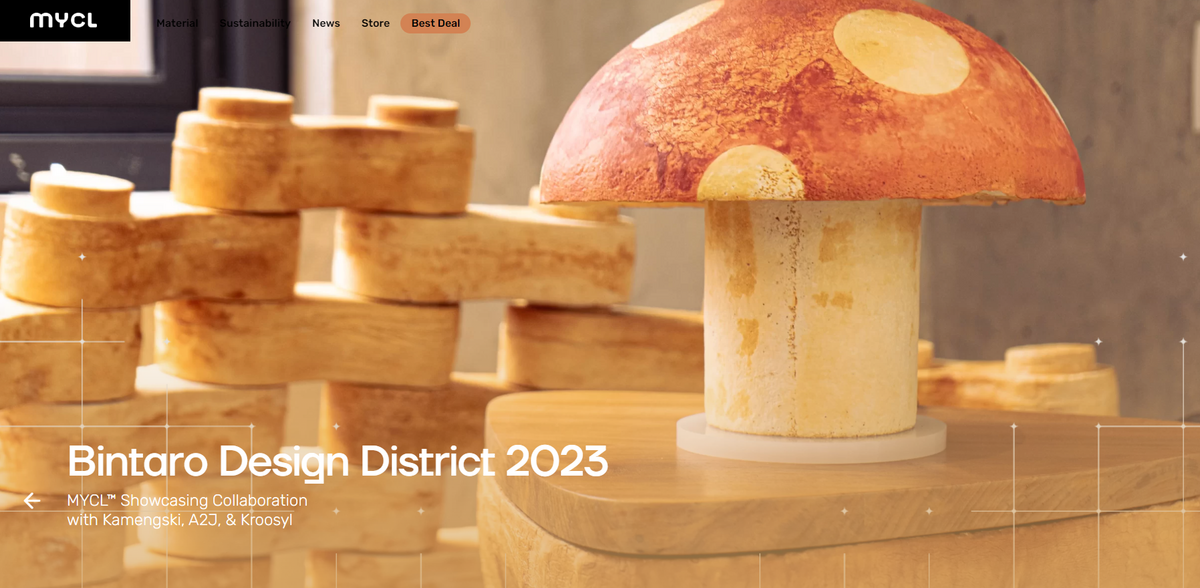What the Project Is About
GROWING SUSTAINABLE LIFE WITH MYCELIUM – an initiative that brings innovative biotechnology to the forefront. MYCL is a biotechnology startup based in Bandung, West Java, Indonesia, researching mushroom mycelium as a new, sustainable material. The project, featured on NHK WORLD JAPAN and showcased at BINTARO DESIGN DISTRICT 2023, highlights collaboration with notable partners such as Kamengski, A2J, & Kroosyl. The project emphasizes the power of a natural network: Mycelium fibers that exhibit agility, collaboration, and inherent strength. It is driven by the mission of providing a high-performance, sustainable alternative for global markets through biotechnology and empowerment of local communities.
Main Benefits And Innovations
The project offers several key benefits and innovative aspects that make a significant impact in the manufacturing and sustainable material landscape:
- 81.5 Overall B Impact Score (2022) – a mark of strong sustainable practices.
- >80% Improvement of GHG Performance Index in 2022 – showcasing reduced greenhouse gas emissions.
- 98% Solid Waste Up-cycled – an excellent example of waste management and circular process.
- Material made from agroforestry byproducts with a unique characteristic surface, demonstrating that “It’s not Leather, It’s Better.”
- A focus on using non-animal and non-petroleum based ingredients, positioning mycelium leather as one of the leading vegan leather options available in the market.
The Mycelium Fibers Advantage
At the core of this project lies the beauty and strength of mycelium fibers – a natural, collaborative, and agile network. These fibers are not just a material; they are a testament to the power of nature when harnessed for sustainable innovation. With Mycelium Fibers, the process of bio-fabricating sustainable materials is taken to a new level, turning agroforestry waste into valuable building material. It is like nature’s hidden potential unlocked, where each strand contributes to producing materials that are both durable and eco-friendly… this process mirrors the intricate design of natural ecosystems.
Exploring the Sustainable Material Portfolio
A diverse range of innovations defines this venture. The sustainable material portfolio includes:
Mycelium Leather (Mylea): A leather-like material made from mushroom mycelium, featuring customizable surface textures. Inspired by mycelium tempeh, it is crafted using agricultural waste as a substrate that is meticulously cultivated and transformed.
Bio Binderless Board: This board is produced from the Mylea byproduct without using any adhesives, meeting modern architectural and design standards with its sustainable construction approach.
MYCL™ Composite: A biodegradable solid-composite material that utilizes naturally growing and shaping mushroom mycelium into desirable forms and functionalities.
These materials are designed to combine environmental consciousness with the rigorous demands of modern building and design practices.
Innovative Mycelium Products
The project demonstrates a broad spectrum of products derived from the magical properties of mycelium. In collaboration with Brain Dead x Space Available, the creation of MYCELIUM FOSSIL ROCK — an intriguing art sculpture using the MYCL™ Composite — blends aesthetics with high-concept sustainable engineering. This fusion of art and science is further enlarged under the banner “We The Fungi,” where the collective spirit pushes forward the narrative of a better, more sustainable future. Every product, from Mylea to BIOBO and MYCL Composite, underlines that the switch from traditional materials to mycelium-based alternatives is not merely a trend, but a strategic shift towards eco-conscious innovation.
Addressing the Future with Responsible Innovation
The project narrows its focus on the future by transforming agroforestry waste into sustainable material. With technologies developed in the Mycotech Lab and supported by collaborations with PT Miko Bahtera Nusantara and Mycotech, the initiative is a reminder that natural processes can be engineered to serve modern design needs. It continuously challenges the idea of what building material and leather-like alternatives can be, positioning them as forerunners in biotechnological evolution. The process, from meticulous incubation of the mycelium substrate to refining the final product, creates materials that are robust, user-friendly, and environmentally sustainable.
Project Impact on Sustainability
- SDG 9: Industry, Innovation, and Infrastructure — representing the project’s strong contribution to innovative industrial practices.
- SDG 12: Responsible Consumption and Production — emphasized by the use of agricultural byproducts and waste up-cycling.
- SDG 13: Climate Action — demonstrated through the significant improvement in GHG Performance Index and commitment to lower emissions.
- SDG 15: Life on Land — as sustainable materials foster a harmonious relationship between human industry and the planet’s ecosystems.
Address And Global Outreach
The physical presence of the project is anchored through its MYCL OFFICE, located at Innovation Factory, Jl. Ir. H. Juanda No.108, Lebakgede, Kecamatan Coblong, Kota Bandung, Jawa Barat 40132, Indonesia. This location is not only the hub of research and development but also stands as a symbol of local commitment to global sustainable goals. The active outreach results in collaborations and showcases that extend beyond national borders, impressing upon industries and communities worldwide that bio-fabricating sustainable material innovations are both achievable and essential. This project underlines that a future built on sustainable practices—where every element of nature is valued—can indeed replace outdated industrial models with a more resilient, eco-friendly alternative.


















